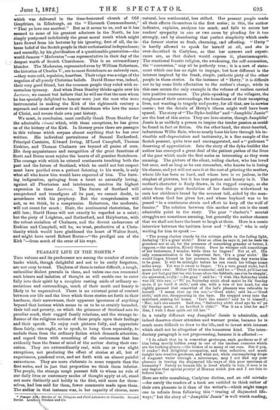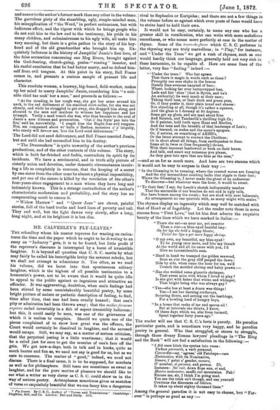PEASANT LIFE IN THE NORTH.* This volume and its predecessor
are among the number of certain books which, though delightful and not to be easily forgotten, are not easy to read. The:form of them is rather difficult, a tough, unfamiliar dialect prevails in them, and unless one can command such leisure and isolation of thought as will enable one to enter fully into their spirit by a complete casting aside of ordinary as- sociations and surroundings, much of their merit and beauty is likely to be unperceived. There is no external point of contact between our life and the lives which these stories set forth in their hardness, their narrowness, their apparent ignorance of anything beyond that horizon which seems to us to be so straitly bounded, their toil and poverty, on which the grimness of Scotland sets its peculiar mark, their rugged family relations, and the strange in- fluence of the religious notions of these people upon their feelings and their speech. To enjoy such pictures fully, and appreciate them fairly, one ought, so to speak, to hang them separately, to seclude them from the ordinary fiction which demands attention, and regard them with something of the seriousness that has evidently been the frame of mind of the author during their exe- cution. They are extraordinarily real, with one or two slight exceptions, not producing the effect of stories at all, but of experiences, pondered over, and set forth with an almost painful earnestness. They are more elaborate in some respects than the first series, and in just that proportion we think them inferior. The people, the strange rough peasant folk to whom no rule of our daily lives or customary modes of thought apply at all, stood out more distinctly and boldly in the first, said more for them- selves, had less said for them, fewer comments made upon them. The straw in that instance was, in her capacity of chorus, more
* Peasant .1.4 Stele/Les of the Villagers and Field Labourers in Glenaklie. Second Series, Londe Strahan and Co. natural, less sentimental, less stilted. Her peasant people made all their effects themselves in the first series ; in this, the author indicates, explains, analyzes too much, and fails to secure her readers' sympathy in one or two cases by pleading for it too strongly, and by abandoning that perfect simplicity which made the former stories so fresh, charming, and affecting. " 'Jetty '" is hardly allowed to speak for herself at all, and she is over-described in Carlylese, so that her sorrows and experi- ences are, as that dialect would express it, phantasmagoric. The emotional frantic religion, the awakening, the self-accusation, the "conversion," may all be perfectly true ; it is a sort of state- ment which one has no right to impugn, but how different is the interest inspired by the frank, simple, pathetic piety of the other people in these stories. In the instance of " Hetty," it is difficult not to lay some little affectation to the author's charge, while in this case occurs the only example in the volume of realism carried into positive coarseness. The plain-speaking of the villagers, the roughness of their surroundings, the homeliness of their unaspiring lives, not wanting in tragedy and poetry, for all that, are in nowise coarse ; but the details of Hetty's illness might well have been spared. The story of "The Dyke-builder " and "Jamphlin' Jamie' are the best of this series. They are love-stories, though Jamphlin' Jamie is as unlikely a person to inspire the tender passion as could be found in fact or fiction. On the other band, the stout-hearted, industrious Willie Bain, who so nearly loses his love through his in- vincible self-depreciation and taciturnity, is a fine sample of the Scotch peasant, quite true and unexaggerated, and a" gudeman deserving of appreciation. Into the story of the dyke-builder the author has conveyed a great deal of the patient pathos of the lives of the poor which made the first series as interesting as they were amusing. The picture of the silent, toiling clacher, who has loved but once, and as long as he can remember, who knows he is losing his chance, and yet will not save it at the cost of grieving the mother,. whose life has been so hard, and whose love is so jealous, is the simplest of pictures, but it has true pathos and beauty in it. The mother's character is finely drawn, in its rugged courage, as she arises from the great desolation of her destitute widowhood to earn her children's bread by the severest toil, aided by the man- child whom God has given her, and whose boyhood was to be passed "in a continuous strain and effort to keep off the wolf of famine." The relation between this mother and son is the most admirable point in the story. The poor " clacher's " mental straggles are sometimes amusing, but generally the author chooses that we shall not have the heart to laugh at them. Here is a comic interview between the taciturn lover and " Kirsty," who is only' waiting for him to speak The young clacher stands by the cottage gable in the fading light, declaring 'It's a gran' nicht !' Ever so often he says it, yet he feels its:. grandeur not at all, for the presence of something grander or better, I. suppose,—the maiden, Kirsty Grant. Does he whisper soft somethings. of her betterness, I wonder, while thus he lingers ? Not at all. His. only communication is the important fact, 'It's a gran' nicht.' He- would linger, blessed in her presence, but the closing day warns hhs. to be gone. It will be midnight before he can reach his village home miles away. Yet was it sweet to linger. It's a vera grand nicht, but 1. mann heist awa'. Mither 'ill be wunnerin', said he.—' 'Deed, ye% hee tae- draw yer feet gey fast tae win hams afore the Sabbath, sae e'en be steppbe, she answered, coolly.' —Its gran' !' said he ; I wish ilka Saiturday nicht was lik' this ane.'—' Wi' ye, Saiturday nicht shad maist be Ilk' Sunday morn, if ye bevil it richt,' said she, with a toes of her head, for she- rightly guessed that somewhat of the lad's pleasure was referable to. herself. '1 mann shut up the coo.'—' Good nicht,' said he.—'Goodi nicht,' said she, disappearing in the byre. He atepped away into the mnirland, making for home. Isn't she smairt !' said he to himself;. Man, isn't she smairt. Said she, "Saiturday nicht shud aye be wi' ye lik' Sunday morn, if ye bevilled it richt !" Was it na a hint for me ?• Man, I wish I deur spaik oat till her.'"
In a totally different way Jamphlin' Jamie is admirable, and indeed deserves closer attention and warmer praise, because he is- much more difficult to draw to the life, and to invest with interest. which shall not be altogether of the humorous kind. The intro- ductory paragraph is not prepossessing, because it is affected:—
" I do admit that he is somewhat grotesque, such goodness ea if of' him being mostly hidden away in one of the unclean crannies which,. are the lurking-places,—the homes of so many of our race. But if you,. 0 reader ! find delightful occupation, and wise reflection, and much- insight into creative goodness, and what not, while contemplating drops of stagnant water through a microscope, may I not find my poor- pleasure in tracing the disjuncted life-ways of this poor specimen of humanity ? Surely no human life is lived wholly in vain, if man is in any degree that special protege' of Heaven which you and I are fain to- believe him."
Here are trite moralising, Carlylese diction, and an odd mistake —for surely the readers of a book are entitled to think rather of' their own pleasure in it than of the writer's—which might tempt, one to refrain from following this "tracing of disjeucted life- ways ;" but the story of "Jamphlin' Jamie" is well worth reading,.
and nearer to the author's former mark than any other in the volume. The garrulous piety of the shambling, ugly, simple-minded man, his misapplication of "the Word," in perfect seriousness, but with ludicrous effect, and the vigour with which he brings people who do not suit him to the law and to the testimony, his pride in his many children, and submissiveness to his ugly wife, all make him very amusing, but there is a grim pathos in the story of his boy- hood and of the old grandmother who brought him up. Ex- quisitely ludicrous is the history of Jamphlin' Jamie's first love, of the false accusation concerning one Meg Bruce, brought against the God-fearing, church-going, psalm-" roaring" laineter, and his rueful conclusion that he had better marry, and so defend him- self from evil tongues. At this point in his story, Bell Fraser comes in, and presents a curious sample of peasant life and character.
This resolute woman, a brawny, big-boned, field-worker, makes up her mind to marry Jamphlin' Jamie, considering him "a suit- able chiel tae mak' her a man," and proceeds as follows :—
" At the steading, in her rough way, she got her arms around his neck, to the sad defilement of his starched shirt-collar, for she was not cleanly, and while he struggled to get away, she dragged him along, and shouted to the men and maidens to witness her happiness and her triumph. Verily a mad wench she was, who thus became to the soul of Jamie a sore distress and persecution. 'Out o' the fryin' pan into the fire,' said he, sorrowfully. ' I scapit frae the Bught free evil tongues. Noo, am compassed aboot wi' bulls o' Bashan, monsters o' a' iniquity, who surely will devoor me, 'less the Lord send deliverance.'"
The Lord did not send deliverance, and Bell Fraser married Jamie, but not until she had reconciled him to his destiny.
"The Dressmakers is quite unworthy of the author's previous productions, and of the other contents of this volume. The story, which is both far-fetched and feeble, contradicts its spirit by its incidents. We have a sentimental, and in truth silly picture of sisterly union and devotion, under domestic circumstances involv- ing a life so completely in common, that the keeping of a secret by one sister from the other must be almost a physical impossibility, and yet one of the sisters is killed by the revelation of the other's four-years-since engagement to a man whom they have long and intimately known. This is a strange contradiction of the author's characteristic moderation and probability, and the story has no compensating merit to excuse it.
"Widow Macraw " and " Queer Jean" are clever, painful stories, full of the hard truths and hard lines of poverty and toil. They end well, but the light dawns very slowly, after a long, long night, and at its brightest it is but dim.



































 Previous page
Previous page